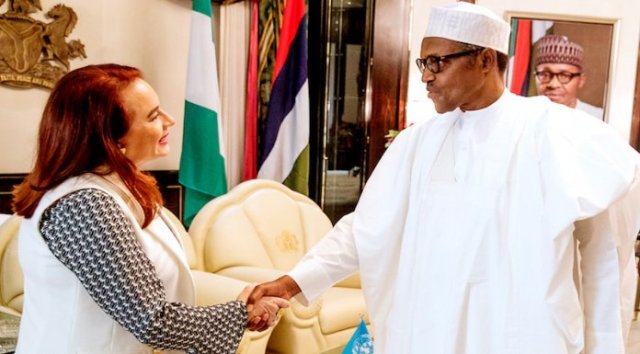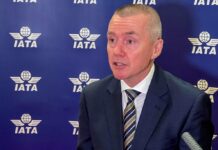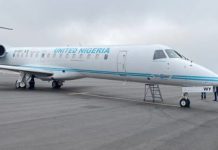
The president of the 73th session of the United Nations General Assembly (UNGA), Ms. Maria Fernanda Espinosa, has proposed a multi-dimensional and holistic approach to end security challenges bedevilling Nigeria and other parts of West Africa.
Espinosa, who arrived in Nigeria on Monday, to discuss issues of Nigeria’s transition as the President of the 73th session of the UNGA, made the call after he was received by the minister of foreign affairs, Mr. Geoffrey Onyeama.
Fielding questions from journalists on growing spate of insecurity in the northern part of Nigeria and how the United Nations was assisting the country, Espinosa, who said she would hand over to a Nigerian, Prof. Tijani Bande, in June, said: “Regarding the question on Nigeria, West Africa and the security challenges, I think that the regional response is extremely important. This Multinational Joint Task Force, I think, has great role to play but it is only a part of the equation.
“Perhaps, more important part of the equation is to look at the challenges in the Lake Chad areas as multidimensional and from a holistic approach.
“These are not fancy words. What I mean here is that the security efforts – this joint task force can work together with the support of the UN to be accompanied by a very strong affirmative action in terms of development, in term of inclusion and looking at the excellent initiatives of this country to resettle and accommodate the internally displaced people; how to address the refugee crises; how to improve quality of education; access to health services – I think it’s one single package.”
Noting that this was her second visit to Africa, since becoming President of the General Assembly, Espinosa stressed that her visit to Nigeria was to further strengthen the ties between Nigeria and the UN, and to raise awareness on the importance of multilateralism with the UN at its centre.
According to her, multilateralism is the only way to tackle, address and solve the global challenges that are impacting lives and livelihood across the world, including climate change.
“In this very region the impact manifested in the decline of Lake Chad Basin and its cascading effects on the environment, on the insecurity and violence, displacement and refugees are all interlinked,” she added.
Responding, Onyeama, who commended her for various achievements as the president of the global institution, appealed to her to help in finding solution to a lot of challenges Africa is facing.
“It is a privilege that you are just coming from Chad and you have seen the climate induced shrinkage of Lake Chad. For us, it is an existential issue because it is a lake that almost 30 million people depend on for their livelihood.
“We have seen it shrink by 90 per cent over the years’ this has created very severe challenge for the people of that sub-region and indeed for our country. We are looking to have the support of the UN and your support in particular to address this challenge.
“One of the mechanisms we have identified is to recharge the lake. It is going to be capital intensive efforts. Something in the area of 40 to 50 billion dollars estimated, and clearly, we are going to leverage on the international community because this is a huge resources and we look for your support.”
Buhari appeals for UN Support
Meanwhile, Buhari at the closed-door meeting with the Ecuadorian politician and diplomat sought the assistance of the world body as well as the international community for the reversal of the devastation of certain parts of Nigeria by Boko Haram insurgency.
A statement by the president’s media aide, Mr. Femi Adesina, said the president told Espinosa that the condition of internally displaced persons (IDPs) in the country was pathetic and required their interventions.
“The condition of internally displaced persons ((IDPs) in the country is pathetic. We have at least a million children who neither know their parents nor where they come from,” the president was quoted, adding: “bridges have been blown up, schools, hospitals, churches, mosques, and other buildings have been destroyed. All these will be rehabilitated, and every form of international help is welcome.”
The president also canvassed support for the recharge of Lake Chad through inter-basin water transfer from Congo River, saying climate change was quite real to the region and noted that no fewer than 30 million people were negatively affected by the shrinking lake, with at least half of them being Nigerians.
Adesina added that Buhari emphasised the role that the international community needed to play in the endeavour, noting that recharging the lake was beyond the financial capacity of the affected countries.
The statement also said the UNGA president commended Nigeria for being a key part of the UN system, describing Nigeria as a well respected country in the global body.
“Nigeria is a major troops contributor to peace keeping operations and a major part of the human rights architecture,” Adesina quoted Espinosa, adding that the UNGA president commended Buhari’s headship of the Economic Community of West African States (ECOWAS), and the Lake Chad Basin Commission (LCBC), pledging to call the attention of the international community to the hurting effects of the Lake Chad problem and other issues raised by the president.
“The UNGA president also lauded Nigeria for rehabilitating the UN building in Abuja, which was destroyed by Boko Haram insurgents during an attack in August 2011,” Adesina added.
Nigeria’s search for UNSC permanent seat divisive
Also speaking at the State House in Abuja, Espinosa said Nigeria’s search for a permanent seat in the United Nations Security Council (UNSC) had remained a pipe dream.
He said there had been no political will among member states to accommodate such request.
“Regarding the question of UN Security Council reform, I have to say very honestly that this is one of the most complex, divisive and contentious negotiations processes at the UN.
“As you know, the reform of the Security Council is under the responsibility of the UNGA, and I have appointed two co-chairs to lead the works of the inter-governmental negotiations that have been taking place for 10 years now.
“The process of reforms started 25 years ago and the mandate to negotiate the reform came 10 years ago when I was the Ambassador of Ecuador at the UN. And at the time I thought we had a resolution to start the negotiations and with a great naivety, I thought this is going to be a process that will, perhaps be for two or three years.
“Ten years later, I have to say that there is no consensus, there are very different views and positions regarding the reform process. As we know, we need consensus to advance reforms.
“This is one of the issues where my work as the president is to lead to make sure that we agree on the fundamentals to ensure that the process is inclusive and transparent. That the outcome of the reform is going to depend very much on the political will of member states themselves.
“Then, of course, the African position is well known and there are also different groups that also have different positions; we are trying to bring them together and find a common denominator.
“And the common denominator is that the Security Council has to deliver more and better because they have the main responsibility to deliver on peace and security agenda of the organization,” she said.
Also answering a question on the plan of the UN towards addressing the humanitarian crises plaguing the Lake Chad region, Espinosa said the organisation had signed a $4.5 million cooperation framework with Nigeria.
She also disclosed that the UN was deploying energy towards supporting countries around the Lake Chad basin with a view to improving the humanitarian support to the region.
With ThisDay report






















































